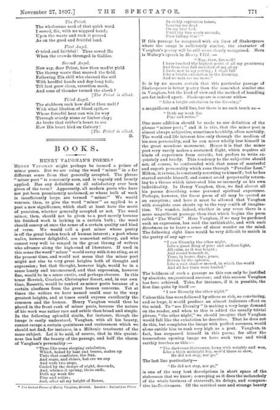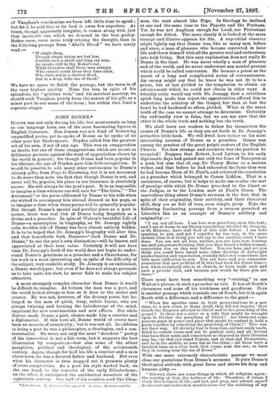BOOKS.
HENRY VAUGHAN'S POEMS.* HENRY VAUGHAN might perhaps be termed a prince of minor poets. But we are using the word " minor " in a far
different sense from that generally accepted. The phrase "minor poet" is constantly seen, and is vaguely and loosely applied. Has any definition at all satisfactory ever been given of the term ? Apparently, all modern poets who have not yet been prominently acclaimed, or whose bulk of work is insufficiently large, are termed "minor." We would venture, then, to give the word "minor" as applied to a poet a new significance, which shall at least have the merit of precision, whether generally accepted or not. The word minor, then, should not be given to a poet merely because his finished work is lacking in a certain bulk ; the word should convey at once the sense of a certain quality and kind of verse. We would call a poet minor whose poetry
is off the great beaten track of human interest ; a poet whose walks, however delightful, are somewhat solitary, and who cannot very well be ranged in the great throng of writers who advance along the high-road of literature. If used in this sense the word " minor" would carry with it no sting, as at the present time, and would not mean that the minor poet might not rise to very great heights both of thought and
'expression; but that thought, however high, would be in a sense lonely and unconcerned, and that expression, however fine, would be in a sense exotic, and perhaps obscure. In this
beim Herrick, Crashaw, Christopher Smart, and, in our own time, Rossetti, would be ranked as minor poets because of a certain aloofness from the great human concerns. Yet at times the writers we have named could soar to the very
greatest heights, and at times could express excellently the common and the human. Henry Vaughan would thus be placed in the front rank of minor poets, because the nature of his work was rather rare and subtle than broad and simple. In the following splendid simile, for instance, though the image is easily understood, Vaughan, with all his beauty, cannot escape a certain quaintness and curiousness which we should not find, for instance, in a Miltonic treatment of the same subject. Let it be said, of course, that in this quaint- ness lies half the beauty of the passage, and half the charm of Vaughan's personality :—
"Thus like some sleeping exhalation,
Which, baked by heat and beams, makes up Tinto that comforter, the Sun.
And soars, and shines, but ere we sup
And walk two steps. Cooled by the damps of night, descends, And, whence it sprung, there ends, Doth my weak fire Pine and retire; And, after all my height of flames,
• The Sacred Pones of Henry Vaughan, SitirriaL London : Bahantyne Prees.
In sickly expiration tames, Leaving me dead On my first bed, Until thy Sun again ascends. Poor falling Star ! "
If this passage be compared with six lines of Shakespeare where the image is sufficiently similar, the character of Vaughan's poetry will be still snore clearly recognised. Here is Wolsey's speech in Henry VIII. :— "Nay, then, farewell !
I have touched the highest point cf all my greatness:
And from that full meridian of my glory I haste now to my setting ; I shall fall Like a bright exhalation in tho Evening, And no man see me more."
It is by no means certain that this particular passage of Shakespeare is better poetry than the somewhat similar one in Vaughan, but the kind of view and the method of handling are far indeed apart. Shakespeare is content with- " Like a bright exhalation in the Evening," a magnificent and bold line, but there is no such touch as—•
" Doth my weak fire Pine and retire."
One more addition should be tnade to our definition of the phrase "minor poet;" and it is this, that the minor poet is almost always subjective, sometimes healthily, often morbidly.
The world and life interest him only through the medium of
his own personality, and he can never wholly lose himself in the great mundane movement. Hence it is that the minor poet very rarely makes a sustained flight, which requires all kinds of experience from outside, but prefers to write ex-
quisitely and briefly. This tendency to the subjective should not, of course, be confounded with that sense of masterful and superb personality which runs through "Paradise Lost." Milton, it is true, is constantly reverting to himself ; but he has started outside himself, and cannot avoid perpetually return- ing to a theme which interested him so intensely as his own individuality. In Henry Vaughan, then, we find almost all his poems describing some personal spiritual experience. Perhaps, however, the finest poem of all may be quoted as an exception ; and here it must be allowed that Vaughan with complete ease shoots up to the very zenith of imagina-
tion. We wonder, indeed, whether in any verse there is a
more magnificent passage than that which begins the poem called "The World." Here Vaughan, if we may be pardoned such an expression, has said the unthinkable, and with such directness as to leave a sense of sheer wonder on the mind. The following eight lines would be very difficult to match in the poetry of any age :—
"I saw Eternity the other night.
Like a great Ring of pure and endless light, All calm, as it was bright ; And round beneath it, Time, in hours, days, years.
Driven by the spheres, Like a vast shadow moved, in which the world And all her train were hurled."
The boldness of such a passage as this can only be justified by absolute, unquestioned success ; and this success Vaughan
has here achieved. Take, for instance, if it is possible, the first line quite by itself :—
" I saw Eternity the other night."
Unless this line were followed by others so rich, so convincing.
and so huge, it would produce an almost ludicrous effect on the mind. To "see Eternity" is making a very large demand on the reader, and when to this is added the usually trivial phrase, "the other night," we should imagine that Vaughan would fall like the exhalation he describes. That he does not do this, but completes the image with perfect sureness, would
alone entitle him to rank very high as a poet. Vaughan, in fact, has surpassed himself in this poem; for after the
tremendous opening image we have such true and vivid earthly touches as this :—
" The darksome Statesman, hung with weights and woe, Like a thick midnight fog, mov'd there so slow, He did not stay, nor go."
The last line particularly-
" He did not stay, nor go," is one of the very best descriptions in short space of the statesman that we know; conveying as it does the melancholy of the whole business of statecraft, its delays, and compara- tive ineffectiveness. Of the metrical ease and strange beauty
of Vaughan's wermilanatian we have left lilac time to speak ; but let it be said that at its best it owns few superiors. At times, though apparently irregular, it cornea along with just that inevitable run which we demand in the beat poetry. Better verse, verse more truly echoing the thought, than in the following passage from "Abel's Blood" we have rarely read :— " If single thou,
Though single voices are but low, Couldst each a shrill and long cry rear, As speaks still in thy Maker's ear, What thunders shall those men arraign Who cannot count those they have slain, Who bath not in a shallow flood, But in a deep, wide sea of blood."
We have no space to finish the passage, but the verse is of the very highest quality. None the less, in spite of his splendour, his "genuine vein," and his metrical mastery, we should rank Vaughan, purely from the nature of his gift, as a minor poet in our sense of the term ; but within that limit a supreme singer.







































 Previous page
Previous page